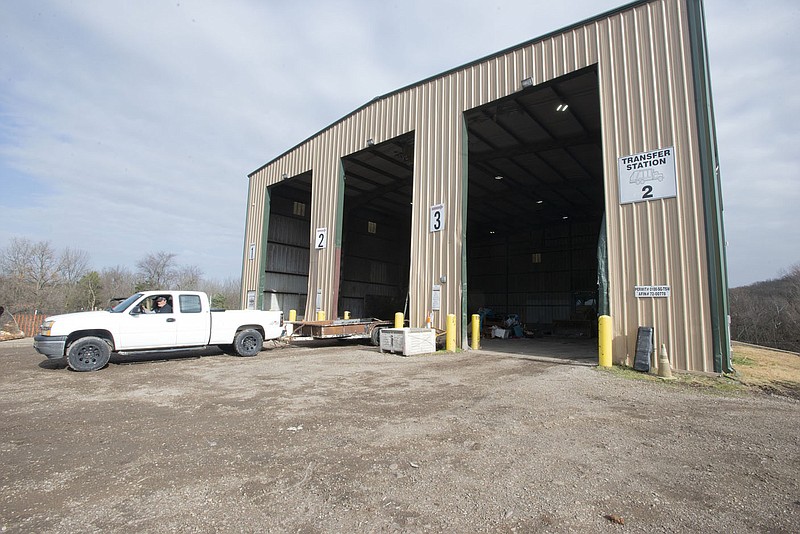FAYETTEVILLE -- A company converting used tires into fuel has said it wants to locate a facility in Washington County as early as May.
The executive committee of the Boston Mountain Solid Waste District's Board of Directors authorized Robyn Reed, the district's director, to develop a letter of intent with Jordan Disposal of Galena, Kan., regarding a company facility on the district's property on Bond Street near Prairie Grove.
Representatives of Jordan Disposal met with district staff and toured the property Oct. 5, according to information from the district. In a draft letter of intent, Jordan Disposal agreed to explore having the company build and operate a facility on the property, which it would lease from the district.
During a meeting held via Zoom, Mads Gisselbaek with Jordan Disposal said the company's Galena facility has reached capacity, increasing from handling about 1,000 tons per year three years ago to about 10,000 tons per year now, and the company wants to expand. He said the majority of the tires used come from the Benton County and Boston Mountain solid waste districts so a facility close to the supply of waste tires makes sense. The company uses the tires to make "tire-derived fuel" used by paper and pulp plants, he said.
"We have a buyer for the tire-derived fuel," Gisselbaek told the committee.
The company laid out a timeline for the project, if it's approved by the district, in the draft letter. The letter proposes a contract could be finalized and agreed to when the full board meets Nov. 11. If that's done, site preparation and construction could begin in March, equipment could be installed in April and processing of tires could begin in May, according to the letter.
Springdale Mayor Doug Sprouse said he favors the idea and supported a motion to have Reed work with the company on a more detailed letter of intent and a possible contract.
Reed said the district's tire program collected 293,965 tires in 2021 and has already received 228,573 so far this year. She said the location of a facility nearby would decrease the cost of transporting the tires to multiple locations.
"We take them to several processors," Reed said. "The cost varies by processor. We do not have a processor that is able to accept all of our tires either because of the high volume or the type of tire. Not all facilities accept all sizes of tires."
The district's tire program received $156,230 in revenue during the third quarter of 2022, mostly from state grants and fees, she said. The district's tire program reported expenses of $210,319 in the same period.
Wendy Bland, director of the Benton County Solid Waste District, said she had discussions with Jordan Disposal about the district's site near Centerton, but the lack of space was a problem. Bland said Benton County operates on about 9 acres while Reed said the Boston Mountain district facility is on about 50 acres.
More News
NoneUsing tires as fuel
According to the federal Environmental Protection Agency, there are several benefits to using tires as fuel:
• Use of tire-derived fuel reduces the amount of fossil fuels that would otherwise be consumed.
• Tire-derived fuel is less expensive than fossil fuels.
• Diversion of tires from landfills reserves landfill capacity for other municipal waste and helps prevent scrap tire piles. Scrap tire piles pose risks because they provide habitat for disease vectors (such as mosquitoes and rodents), and because they can catch fire, creating large amounts of toxic smoke and hazardous liquids that can contaminate air, water and soils.
• Some state agencies suggest cement kilns add tire-derived fuel to their coal fuel in order to decrease emissions of oxides of nitrogen.
• Tire-derived fuel offers the potential advantage of decreasing emissions of oxides of sulfur when used to replace high sulfur coal in cement kiln applications.
• In cement kiln applications, the ash resulting from tire-derived fuel and coal combustion becomes an integral component of the product, eliminating the landfilling of ash.
Source: U.S. Environmental Protection Agency

